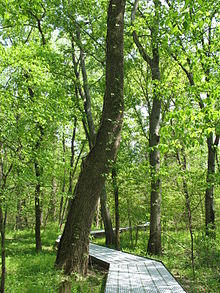Bottomland forest

Bottomland forest is woodland on lowland alluvial floodplains or lower terraces of rivers and streams.[1] Bottomland forest is very rare in Europe.[2] The bottomland hardwood forest is a type of deciduous and evergreen hardwood forest found in broad lowland floodplains along large rivers and lakes in the United States[3] and elsewhere.[4] They are occasionally flooded, which builds up the alluvial soils required for the gum, oak and bald cypress trees that typically grow in this type of biome.[5] The trees often develop unique characteristics to allow submergence, including cypress knees and fluted trunks, but can not survive continuous flooding.[6]
Typical examples of this forest type are found throughout the Gulf Coast states, and along the Mississippi River in the United States. It is estimated there were 24,000,000 acres (97,000 km2) in the region before foresting and farming reduced it to approximately 4,000,000 acres (16,000 km2) today.[7][8]
On the Black Sea coast of Turkey there is Lake Saka Nature Reserve in İğneada Floodplain Forests National Park, Sarıkum Nature Reserve in Sinop, and Hacıosman Wood Nature reserve in Samsun.[9]
References
[edit]- ^ "Bottomland Forests". Benton Soil And Water Conservation District. Retrieved 2024-04-14.
- ^ Kirwan, Guy; Demirci, Barbaros; Welch, Hilary; Boyla, Kerem; Özen, Metehan; Castell, Peter; Marlow, Tim (2008). The Birds of Turkey. Helm. p. 35. ISBN 9781408104750.
Bottomland forest is an extremely rare habitat throughout Europe
- ^ "Bottomland Hardwood Forest" (PDF). Louisiana Department of Wildlife and Fisheries. December 2005. Archived from the original (PDF) on March 6, 2007. Retrieved 2009-04-25.
- ^ "Human Interventions on Wetlands and their Long Term Impacts on Human Well-being a study of Kizilirmak Delta case, Samsun, Turkey" (PDF).
- ^ "Bottomland Hardwoods". School of Forest Resources and Conservation at the University of Florida. Archived from the original on 2009-05-27. Retrieved 2009-04-25.
- ^ "Wetlands: Bottomland Hardwoods". Environmental Protection Agency. Retrieved 2018-04-26.
- ^ "The Big Woods of Arkansas: An Imperiled National Treasure". The Nature Conservancy. Archived from the original on 2018-04-27. Retrieved 2018-04-26.
- ^ Yin, Yao, et al. “Bottomland Hardwood Forests along the Upper Mississippi River.” Natural Areas Journal, vol. 17, no. 2, 1997, pp. 164–73. JSTOR website Retrieved 6 Jan. 2023.
- ^ Kirwan, Guy; Demirci, Barbaros; Welch, Hilary; Boyla, Kerem; Özen, Metehan; Castell, Peter; Marlow, Tim (2008). The Birds of Turkey. Helm. p. 35. ISBN 9781408104750.
